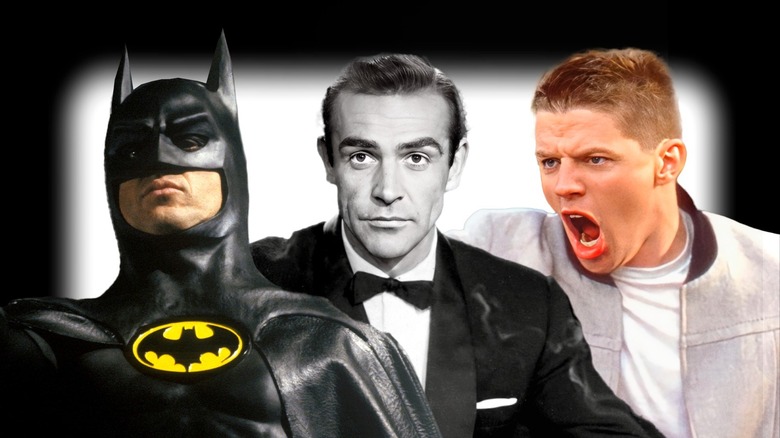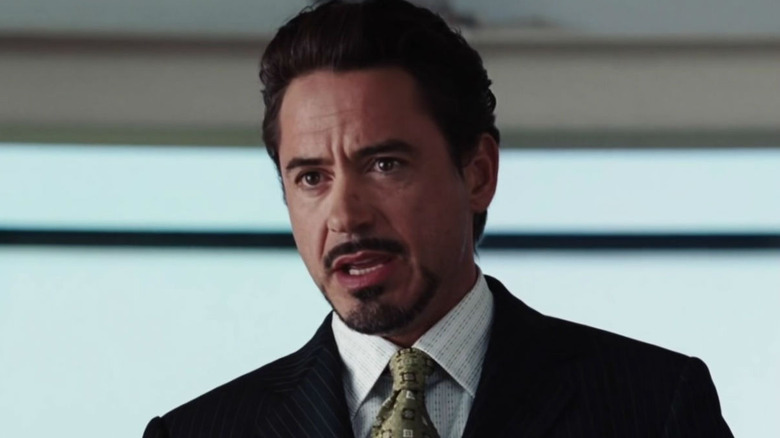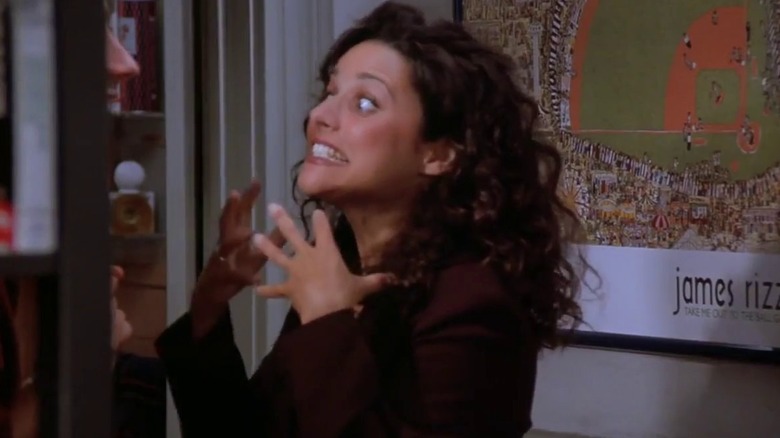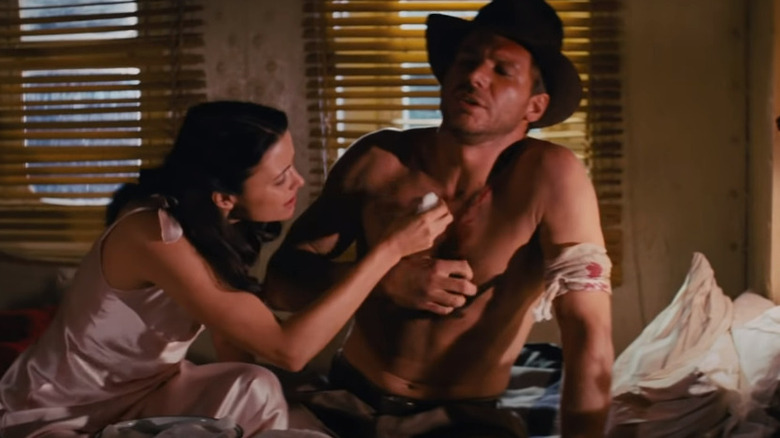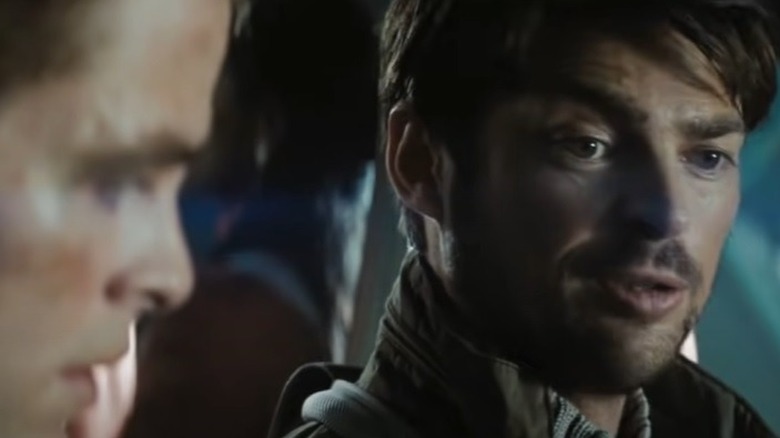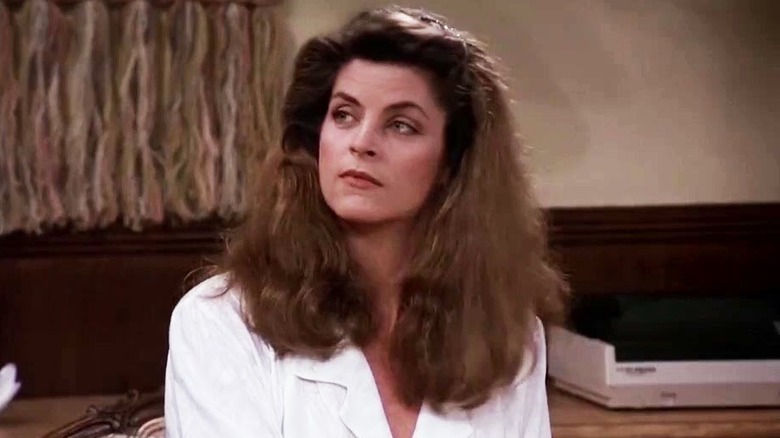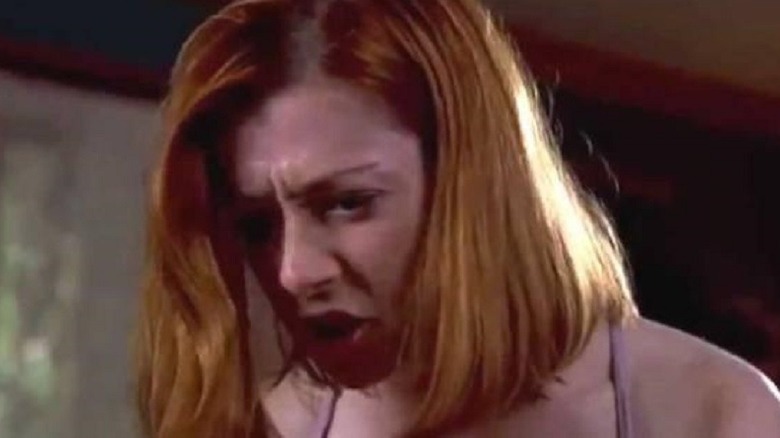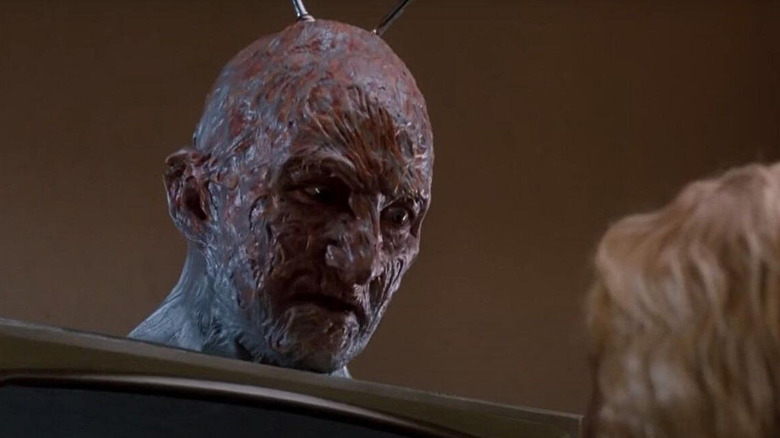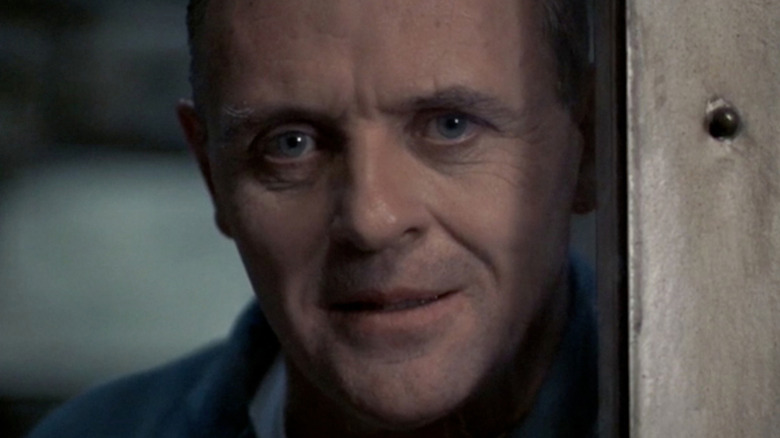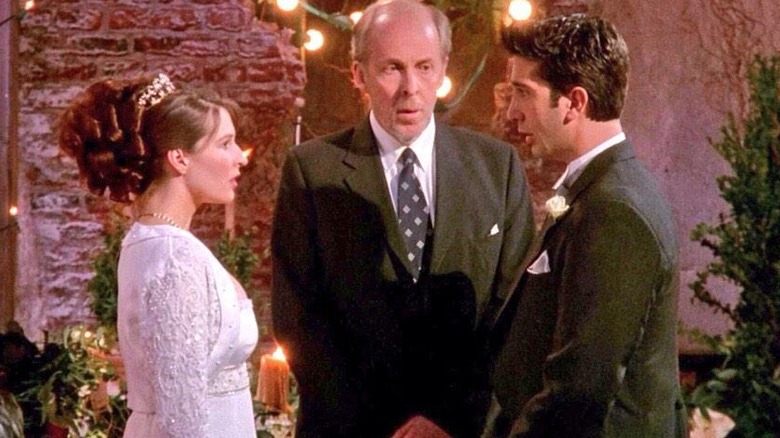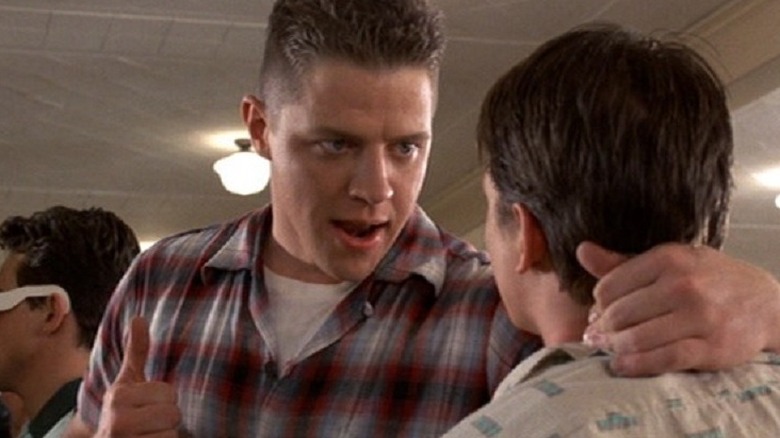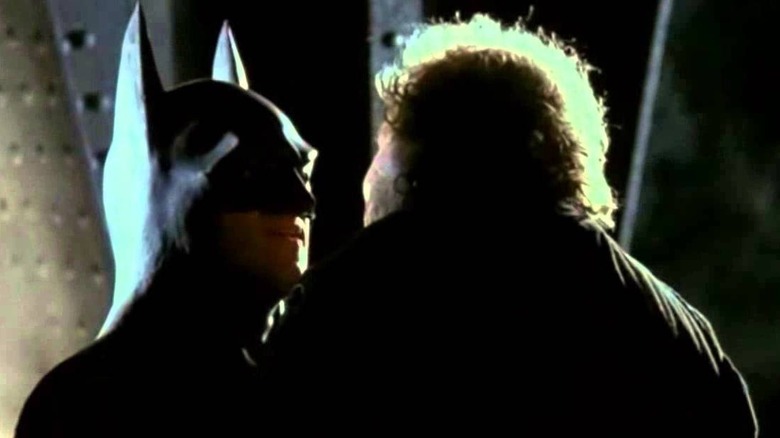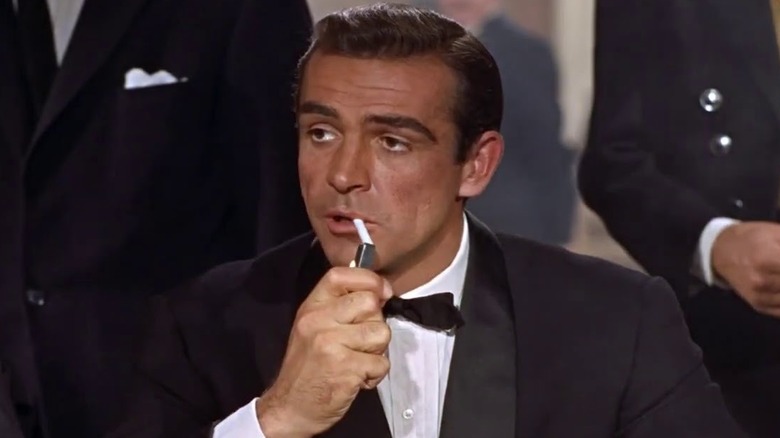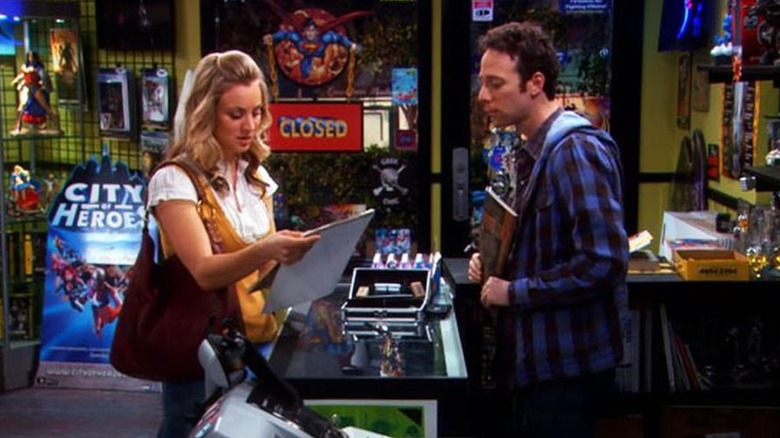Improvised Lines That Changed Roles Forever
Whether it's rewording the way a line is written or coming up with something new that wasn't on the page at all, actors frequently ad-lib their dialogue in an effort to improve flow, add in a joke, or simply because they have an idea they want to try out for the character. While these improvisations don't always pan out, there are times when an actor comes up with something new to say or do on the spot that makes it into the final cut.
In some cases, actors will say something off the top of their heads while in the moment that ends up making a huge impact on their character. Actors typically play a major role in defining the characters they play, and while that often comes during preproduction and off-camera workshopping, sometimes characters can evolve in interesting and surprising ways based on the way an actor decided to approach a scene or deliver a line on the spot. In fact, some of the most well-known catchphrases, personality traits, or other aspects of iconic characters were born out of something an actor decided on during a scene that hadn't been planned in advance.
Tony Stark's secret identity reveal in Iron Man
One of the ways that the Marvel Cinematic Universe stands out from many previous comic book movie adaptations is that there isn't a huge focus on dual or secret identities. In Richard Donner's 1978 "Superman" movie and the various incarnations of "Batman" and "Spider-Man," much of the conflict centers around the struggle of the protagonists trying to balance their secret dual lives as regular citizens and superheroes.
Of course, comic book readers know that there are plenty of heroes and villains who don't even attempt to pretend they are anything else. And Robert Downey Jr. ended up playing a big part in laying that foundation for the MCU, as Tony Stark just comes right and out and declares, "I am Iron Man," in a televised press conference at the end of 2008's "Iron Man," a choice that the actor improvised on the spot.
Not only did Stark repeat some version of the line multiple times throughout the films, but several subsequent heroes also did their own version of the announcement in introducing themselves to the MCU.
The first of Elaine's many excited shoves on Seinfeld
Though "Seinfeld" defined itself by either poking fun at long-established sitcom tropes or specifically forgoing them entirely, most of the characters on the show did have some catchphrases and running gags. For instance, Elaine Benes — brilliantly portrayed by Julia Louis-Dreyfus, who earned Emmy nominations for seven of the show's nine seasons and took home the award in 1996 — got so worked up over being told exciting or shocking news that she would shout "Get out!" and literally shove the person who delivered said news.
As the series went on, her shoves got more aggressive and the reactions to them were increasingly over the top, sending people careening off nearby walls or into the next room and completely out of frame. It got a huge laugh from the studio audience every time, especially Elaine's first-ever shove, which Louis-Dreyfus improvised on the spot during filming, based on her own tendency to actually do something similar in real life. The audience loved it, and one of the funniest and longest-running elements of the character was born.
Indiana Jones's self-deprecating character
While Harrison Ford was already 39 when he made his debut as Indiana Jones in "Raiders of the Lost Ark," aging action heroes were common at the time, thanks to the likes of James Bond, Dirty Harry, and John Shaft. However, most tended not to directly address that they were no spring chickens and certainly weren't eager to poke fun at themselves for it.
This aspect of Indiana Jones is one of the many things that made him so unique and endearing. As it turns out, a Harrison Ford ad-lib played a big part in establishing that aspect of the character. In the scene where Marion (Karen Allen) is helping Indy dress his wounds, Indy is wincing and grimacing at his various aches and pains, prompting her to remark that he's not the same man she knew ten years prior. In response, Ford improvised the now-iconic line, "it's not the years, honey, it's the mileage."
It wound up being the first of many instances of Indy being self-deprecating about his age, and it would also inspire similar traits in subsequent older action heroes like John McClane ("Die Hard") and Roger Murtaugh ("Lethal Weapon").
The origin of Dr. McCoy's nickname
Things were pretty loose on the Enterprise during the original series of "Star Trek." For one, most of the crew referred to Captain Kirk by his first name — and not even James, but Jim. In addition, Dr. Leonard McCoy was most commonly referred to by the nickname "Bones," affectionately given to him by Kirk.
Among the ways that the 2009 "Star Trek" movie used the alternate timeline excuse to establish a new canon was by giving Dr. McCoy's nickname a more specific and clearly-defined origin. In the scene that shows McCoy and Kirk first meeting in what is now known as the Kelvin Timeline, McCoy is nervous about going into space, which he deals with by being chatty and oversharing a bit. McCoy explains to Kirk that he's recently divorced and that his ex-wife took everything, and director J.J. Abrams confirmed on the movie's DVD commentary that Urban ad-libbed the hilarious "all I got left is my bones" topper at the end of McCoy's story.
It stayed in the movie, and — for the Kelvin Timeline at least — is now the canonical reason why Kirk started calling McCoy "Bones."
Rebecca's sense of humor on Cheers
Much of "Cheers" was built around the chemistry between Sam (Ted Danson) and Diane (Shelley Long). But when Long left at the end of Season 5, someone was going to need to fill Diane's role going forward. Enter Kirstie Alley as Rebecca, who served as Sam's new (but very different) female foil for a further six seasons of the hit show.
In a Hollywood Reporter feature that brought together most of the core "Cheers" writing staff, they admitted that they didn't know how to make Rebecca funny, or if Alley could be funny. In her first few episodes, Rebecca got fairly little screen time and almost felt like a secondary character, with the writers confessing that they kept coming up with off-screen tasks for her to do so they could focus on writing jokes for the characters they were already comfortable with.
That all changed one day when Alley struggled to open a door in rehearsal, improvising the amusing line, "I locked myself out, no I didn't." It was at that moment that Alley proved her comedic chops to the team, and Rebecca soon got the screen time and the jokes she deserved.
Michelle's dominant side in American Pie
In the late 1990s, the somewhat dormant genre of wild sex comedy movies popular in the 1970s and '80s began to reemerge. "American Pie" led that charge in 1999, earning its R rating in ways that big studio comedies hadn't been doing for a long time.
One of the most surprising of the film's adult-oriented gags was the revelation as to what truly went on at the band camp that Michelle (Alyson Hannigan) frequently reminisced about. It immediately subverted everything the audience thought they knew about the character up to that point, showing that Michelle was far from the shy, innocent band geek she seemed to be. While filming the scene where Michelle and Jim (Jason Biggs) finally hook up, Hannigan decided to take Michelle to an even raunchier level and ad-libbed the "say my name!" line. Hannigan even advocated for the line to stay in after producers were initially iffy about including it.
Michelle's dominant side in her relationship with Jim ended up being a key aspect of both characters throughout the rest of the "American Pie" sequels.
Freddy Krueger's new catchphrase
In contrast to his largely silent horror peers Jason Vorhees and Michael Myers, Freddy Krueger was always a rather chatty bad guy who would talk at his prey before, during, and even after dispatching them. In addition to his many puns, he often ends his quips with the b-word, a quality that is so woven into the fabric of his character that there are supercuts of all the times he's said it, and "Rick & Morty" even made it one of the defining traits of the Freddy parody character, Scary Terry.
Looking back, it might come as a surprise that Freddy didn't use this word at all until the third "Nightmare on Elm Street" movie, subtitled "The Dream Warriors." What's even more surprising is that actor Robert Englund ad-libbed the line that began the trend of Freddy signing off his puns with a little profanity. While the always humble Englund says that much of what defines Freddy as a character is a result of the writers of the films, he takes credit for the line "Welcome to prime time, b*tch" himself — the first instance of Freddy using that word.
Hannibal Lecter's deeper level of creepiness
Much of what makes Hannibal Lecter such an enduring movie villain decades after "The Silence of the Lambs" is the absolutely flawless performance of Anthony Hopkins, portraying Lecter as a man who is undeniably disturbed on an incredibly deep level but wears it just beneath the surface — except for those rare occasions when it bubbles over.
Much of the film revolves around the interplay between Lecter and FBI trainee Clarice Starling (Jodie Foster). Lecter respects Clarice more than he respects most people, and although he is frequently playing psychological mind games with her, he also wants her to be able to trust him, so he is typically on his best behavior. A major exception to this — and one of the only times his façade of sanity ever slips while interacting with Clarice — is when he tells her the story of killing and eating a census taker.
He ends the story with that infamously chilling hissing sound he makes as he quickly flicks his tongue in and out, which was ad-libbed by Hopkins and remains the character's defining cinematic moment.
Ross mistakenly saying Rachel's name at the altar
In the pantheon of television "will they or won't they?" relationships are Ross (David Schwimmer) and Rachel (Jennifer Aniston) on "Friends." Ross spends a few seasons pining for her, they finally get together for a bit, they split up, they get drunkenly married in Vegas but don't officially get back together, have a child together but still don't get back together, and then finally reunite during the series finale.
In the midst of all that is Ross's relationship with a woman named Emily (Helen Baxendale), which progresses all the way to their wedding day. Just when they are about to make it official, Ross slips up and says Rachel's name in his vows, thus reigniting their complicated on-again, off-again relationship. While it wasn't technically something that Schwimmer actually ad-libbed in the moment, the writers did end up putting it in the script after Schwimmer flubbed the line during rehearsal and said "Rachel" instead of "Emily" entirely by accident.
It got such a big reaction that it was written into the show and wound up proving once and for all that Ross truly wasn't over Rachel — and probably never would be.
Biff's mixed metaphors in Back to the Future
Even though the "Back to the Future" series is home to a lot of legendary casting drama — from ditching Eric Stoltz in favor of Michael J. Fox after filming had already begun and swapping Jennifers between films to Crispin Glover's lawsuit over the use of a lookalike in the sequel — it also has some of the most perfectly cast characters of all time. That includes comic actor Thomas Wilson and his hilarious portrayal of bully Biff Tannen (and various other Tannens).
Wilson also deserves credit for blessing the Tannen family with one of their fan-favorite features — the way they completely butcher common insults by mixing metaphors in the most wonderfully ridiculous ways. That all started with the 1950s version of young Biff telling Marty to "make like a tree and get out of here," rather than finishing off the line with the more appropriate "and leave." Wilson takes the credit for that line, riffing it on the spot.
Not only did it stay in the movie, but Biff and other members of the Tannen clan went on to spout other mixed metaphors throughout the franchise, including "that's as funny as a screen door on a battleship."
The iconic Batman introduction from the 1989 movie
It was a quote that was already embedded in pop culture even before many people actually saw the 1989 version of "Batman." One of the most heavily-featured moments in trailers and commercials for Tim Burton's "Batman" movie sees the titular caped crusader grab a thug and be asked who he is, which elicits the response, "I'm Batman." It not only announces the character's introduction in the movie, but his re-introduction into the cultural zeitgeist as a whole.
As important as the line is to both the movie and its marketing, it wasn't actually in the script. Instead, Bruce Wayne was supposed to tell the thug, "I am the night," meant to be heard as both "night" and "knight," referencing the character as both nocturnal and the Dark Knight. It's clever, and would've been cool in the movie — though perhaps a little less so in commercials. But Keaton had reportedly grown tired of saying the line take after take, and eventually decided to just say, "I'm Batman." And wouldn't you know it, that's the take that was ultimately used.
The line quickly grew beyond just that one movie, and has been repeated or otherwise paid tribute to in multiple Batman films and television shows.
James Bond's most famous phrase in Dr. No
"The name's Bond...James Bond." It's so closely associated with the character that it's easy to assume it was written by Bond creator Ian Fleming himself for the British superspy's original literary debut. Remarkably, that's not the case, and we have none other than Sean Connery — the first person to depict James Bond on screen and still considered by many to be the definitive portrayal of the character — to thank for giving Bond his most famous line.
The script for "Dr. No," 007's first film adaptation, had the secret agent introduce himself by saying "I am James Bond." But Connery knew that such a generic greeting was hardly befitting of the cinematic debut of the character. So when it came time to shoot the scene, he came up with the more unique and impactful, "Bond. James Bond," on the fly instead. It helped to immediately define the character's style not only for that movie but every subsequent portrayal to this day.
Stuart's entire personality on The Big Bang Theory
For the most part, "The Big Bang Theory" was defined by its main cast members. The primary exception to this was comic book store owner Stuart Bloom (Kevin Sussman), who made his debut in Season 2, spent a few seasons as a recurring character, and then joined the main cast in Season 5. He was one of the only main characters on "The Big Bang Theory" to exist outside the core group of seven that comprised the show's main social circle — perhaps more a result of his own introverted nature than any particular narrative decisions.
And that characterization of Stuart — lacking confidence and generally assuming nobody likes him or wants him around — came almost entirely from a quick little throwaway joke that Sussman ad-libbed during the third season. Prior to that, Stuart was a rather unassuming character who wasn't all that different from the other guys on the show. But after Sussman decided to throw in a quiet "I love you" to Penny (Kaley Cuoco) that wasn't in the script, the writers seized on it and began to retool Stuart by making the character depressed, unlucky, and socially awkward.
